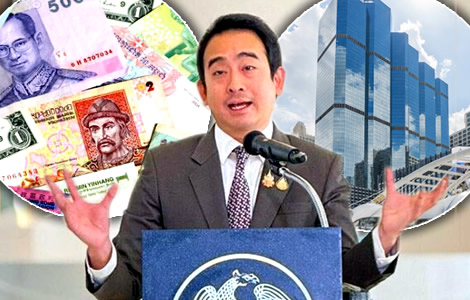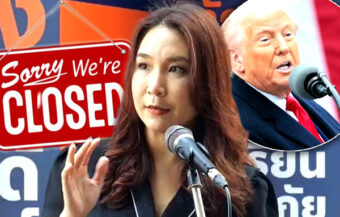Thailand’s cabinet to review plans for a world-class financial hub in Bangkok. The new centre aims to attract top global firms, enhance economic competitiveness and strengthen Thailand’s international financial clout. A draft bill is set for approval in February.
Thailand’s cabinet in early February is expected to approve a blueprint for a new world-class financial services centre in Bangkok. Details of the new bill were given to reporters on Wednesday by Deputy Prime Minister Paophum Rojanasakul. He said the new centre would seek to have Thai subsidiaries of the leading international financial service firms based in Thailand. In particular, the deputy finance minister suggested that the activities of the new financial centre would be ring fenced from the capital’s normal financial centre. In short, it will be akin to having offshore banking brought home for international clients and domestic clients who wish to invest abroad. The initiative aims to boost confidence in Thailand’s economy and, additionally, its competitiveness.

The Ministry of Finance is to present a draft bill in early February, setting out the framework for the new financial services hub to be created in Bangkok. The new law has 96 different sections which will help the government facilitate and administer the new Financial Centre.
Certainly, the goal of the bill is to strengthen Thailand’s financial clout on the international stage. At the same time, the ability to raise finance will be strengthened. In turn, this will help enhance competitiveness.
The new law aims to attract foreign financial institutions to establish subsidiaries in Thailand. At length, these would be Thai-registered companies aligned with their international counterparts.
Financial services centre aims to attract global firms and support diverse sectors in Thailand’s economy
The Financial Services Centre will target eight different types of activity. Initially, these will include commercial banking operations, payment service providers, securities and securities trading, futures contracts trading operations, digital asset sectors, insurance firms, reinsurance firms and service providers that help support the financial services industry.
A similar project was launched in Ireland in 1987. It was the brainchild of controversial Irish leader Charles J. Haughey.
Beginning on a site on Dublin’s docklands of 11 hectares, its main attraction was a 10% corporate tax rate, its proximity to London and an English-speaking workforce. In the meantime, the centre has helped to revitalise the Irish economy, including the government’s finances.
The centre, in particular, has become a global nexus for hedge funds. At the same time, nearly all leading international financial institutions are based there.
Oversight and residency rules to regulate firms and align Thailand’s banking with global standards
Speaking to reporters on Wednesday, the minister outlined some considerations. For instance, the new service centre firms would be required to employ Thai workers in proportion to foreign executives. Furthermore, the financial services centre will only be able to service non-residents.
Furthermore, the centre would be subject to strict oversight, especially relating to Thailand’s existing banking and money laundering regulations.
At the same time, there will be some exceptions to the non-residency rule. Ultimately, reinsurance firms will be able to provide services to Thailand’s insurance sector.
Similarly, in relation to capital markets, the centre will be empowered to assist Thai investors operating abroad. In addition, financial institutions will be able to work peer-to-peer with Thailand’s existing banks and financial service providers.
Meanwhile, foreign currency exchange providers will be treated as non-resident and therefore subject to exchange controls.
Thailand to establish oversight authority to ensure standards and prevent abuse in financial operations
The Deputy Minister of Finance also revealed that an oversight authority will be established, chaired by the Minister of Finance. Primarily, it will be responsible for promoting the Bangkok International Financial Services Centre.
Following this, the authority’s board will establish its own regulations for the administration of the centre. The goal will be to ensure it operates to the highest international standards.
Certainly, it will be tasked with preventing abuses such as money laundering or the supply of financial services to illegal operations. Indeed, the minister emphasises the need to impose anti-terrorism screening.
“In addition, Thailand has a financial infrastructure that is more developed than many countries in the region. Developing Thailand to be a financial centre of the region will attract foreign financial businesses to invest in Thailand, allowing more workers with financial skills from abroad to work in Thailand, resulting in the development of financial businesses in Thailand, creating jobs in the country, and transferring skills and technology to Thai workers,” outlined Mr Paophum.
Bill expected to pass cabinet review by February and proceed to parliament by late March 2025
The minister told reporters that the bill would be presented to the cabinet in early February. Afterwards, it will be reviewed by the Office of the Council of State. Mr Paophum estimated this would take 50 days before this process is complete.
Subsequently, it will be sent to parliament. The minister further suggested that he expects to have passed its first reading by late March 2025.
Expats seeking a new life face challenges with stricter banking and taxation rules being pushed
Thailand’s financials are sound but the economy is exposed if another world banking crisis emerges
Government to take its chances by legalising casino complex operations and online gambling in Thailand
The new bill is coming at a time when Thailand’s banks are reining in lending to less competitive sectors of the economy. The country is widely seen as in the grips of a credit squeeze. In the meantime, 98% of government debt is owned by Thai investors.
Join the Thai News forum, follow Thai Examiner on Facebook here
Receive all our stories as they come out on Telegram here
Follow Thai Examiner here
Further reading:
Minister outlines plans for Casinos, Disneyland and a tax support system for workers to Parliament
Legal casinos and gambling in Thailand being weighed up carefully after Deputy PM’s backing
Top Royal Thai Police officers under scrutiny over links to huge illegal online gambling cash flows
Unlikely rags to riches convict star arrested again in Thailand over online gambling promotion
PM plays clips to parliament to defend himself against media ‘distortion’ of gambling claims
Rayong gambling boss is arrested as fact-finding panel finds police and officials acted corruptly
Gamblers and hosts at illegal gambling dens are being jailed as massive crackdown proceeds apace


















